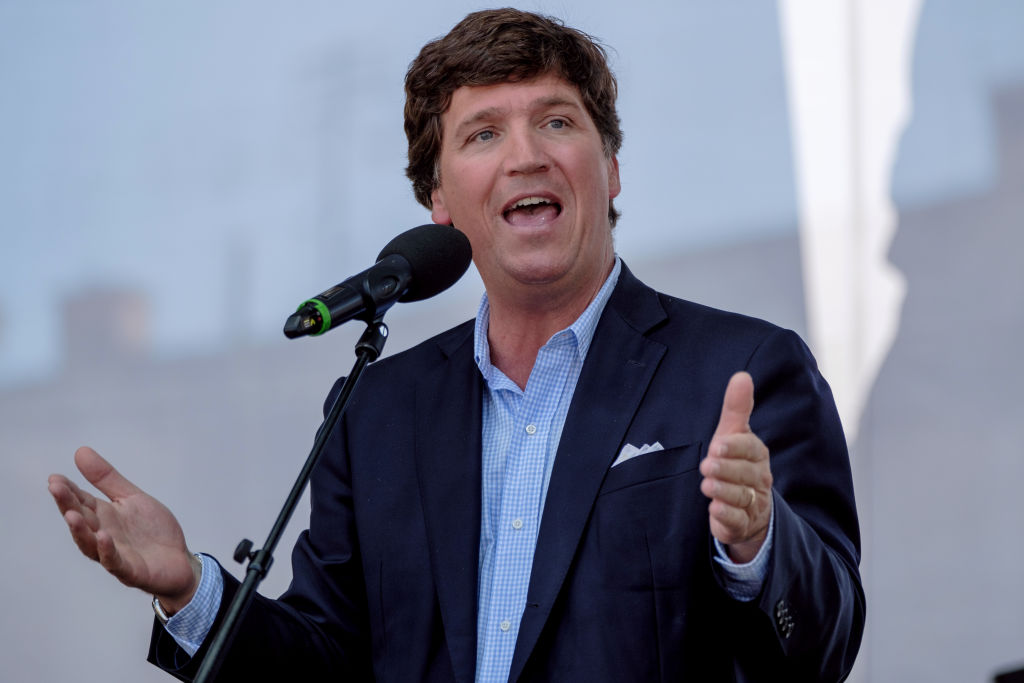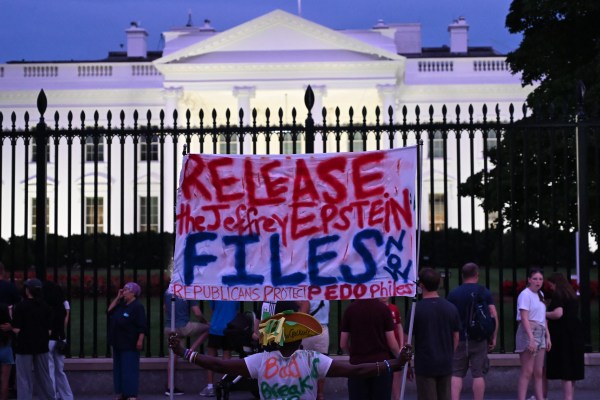Where were you when the world stopped turning? I’ve had two such moments in my life, but only one was obvious in the moment. On 9/11, we were living on the West Coast, so a phone call from my brother woke us up. My husband’s end of the conversation told me he was alarmed, and he fumbled for the remote. The TV told us everything we needed to know.
Three years ago today, I was folding laundry and watching Donald Trump fumble his way through his Oval Office address on the coronavirus pandemic. At the same time he was speaking, the NBA announced that it was shutting down indefinitely after Utah Jazz player Rudy Gobert tested positive. And then came the news alert that Tom Hanks and his wife, Rita Wilson, had tested positive. Googling around, I realize now that that was also the day that the World Health Organization declared a pandemic, but it’s that trio of events from that evening that sticks out in my mind.
The shock from 9/11 was immediate. Someone—I remember Shepard Smith on Fox News suggesting very early it could be Osama bin Laden—had declared war on the United States and its citizens. COVID was different. The dominoes did start falling pretty quickly after March 11: Gov. Mike DeWine announced the next day that schools in Ohio would close for three weeks (my actual response: “Three weeks? That’s tooooo lonnnnnng.”), the NCAA Tournament (high holy days in the Larimore household) and eventually all major sports were canceled, and within two weeks Ohio was under stay at home orders. But we had no idea, really, what was to come. Remember “15 days to flatten the curve”?
Those early days—I’m not going to lie—weren’t terrible. They were different, sure. The kids figured out Zoom school well enough, I happily surrendered our home office to my husband, who is in finance and needed a private space, and we did our best to keep our favorite local breweries in business.
On 9/11, as we watched in shock as the World Trade Center and Pentagon burned, I remember my husband saying, “Everything is different now.” He was right. Within weeks we were at war in Afghanistan. Congress passed the PATRIOT Act (Did we really need an acronym for that one, folks?) and created the Department of Homeland Security. Air travel has never been the same.
In the long run, COVID might have changed us more. And not just because so many people died. It’s impossible to separate it from the other problems we face as a society, but it definitely exacerbated them. Would the racial justice protests in the summer of 2020 have been so pronounced or led to so much rioting and violence if people hadn’t been cooped up for three months? An entire generation of kids is grappling with learning loss. We have lost 1.1 million Americans—almost three times as many who died during World War II. Families have fractured and friendships ended over debates about masking and vaccination. And what’s depressing—on top of all the other stuff—is that the divisions wrought by this pandemic will probably make it harder to improve our response if, heaven help us, another such event happens again.
On that cheerful note, thank you for reading and have a great weekend.
Was January 6 justified because of election fraud? Was it just a no-big-deal stroll through the Capitol? Was it a setup by Antifa? Or could it have been all of them? Most Americans know it was actually none of those things—it was a violent riot and a serious threat to our long tradition of successful transitions of power. But for a certain segment of the population, the only thing that matters is that it wasn’t Donald Trump’s fault. In Boiling Frogs (🔒), Nick notes that Fox News indulged its viewers’ belief in the illegitmacy of the 2020 election and chastises Tucker Carlson for feeding them cherry-picked footage from inside the Capitol that day. “Faulting D.C. cops for not anticipating the threat from meek sightseers makes no sense, but it doesn’t need to. Carlson isn’t sketching out a narrative of the insurrection, he’s offering viewers different paths to reach the conclusion that whatever happened that day shouldn’t be held against Trump, the Republican Party, or the broader right.”
It’s hard to call a lenghty piece that delves into the Commerce Department’s guidelines for applicants seeking subsidies to build semiconductor factories under the CHIPS Act a “hot take” but this is about as spicy as Scott Lincicome gets. In Capitolism (🔒)He wonders why, if the bill was such an urgent matter of national security to protect us against China, it’s larded up with social policy, financial restrictions, and measures to address “environmental justice concerns.” Companies must show how they plan to offer affordable childcare for employees, and will have a better chance of receiving money if they stop doing stock buybacks or paying shareholder dividends. The guidelines also favor companies that buy American goods for construction and hire unionized workers. “Much of Congress voted for a bill to boost domestic semiconductor production, not to ban buybacks (they actually voted against that) or to fund labor unions, childcare, corporate DEI offices, and “environmental justice.” Cost incidence aside, this intent should matter—especially for the “conservative” Republicans who are supposedly fighting an existential culture war against the Woke Left (or whatever) yet woke up last week to discover they voted to subsidize DEI and environmental justice initiatives at some of the largest companies on the planet. Oops?”
Glenn Youngkin won the Virginia governor’s race on a campaign of moderation, which helped him win back some of the suburban women turned off by the GOP’s embrace of Trumpism, but he is a staunch conservative. Could he be the cure for what’s ailing the party? And does he want to be? Even those close to him aren’t sure whether he wants to make a run in 2024. From the Dispatch Politics newsletter: “Youngkin’s allies say the governor is less interested in running nationally than he is in preserving GOP control of the Virginia House of Delegates and engineering a takeover of the Virginia Senate, where Democrats are clinging to a two-seat majority.” Also in the newsletter: Andrew, David Drucker, and Audrey look at Ron DeSantis’ legislative agenda in Florida and also write about how Biden’s support for the congressional override of the D.C. crime bill blindsided some House Democrats.
And here’s the best of the rest:
- Charlotte interviewed former National Security Adviser Stephen J. Hadley, who served under George W. Bush, about how China has evolved under the Xi Jinping regime. “Xi Jinping has asserted the party into every aspect of Chinese life and accompanied it with a real crackdown on any internal dissent,” he told her.
- Speaking of China, Gary Schmitt applauds Joe Biden for vowing to defend Taiwan against a Chinese invasion, but he advises the president to get congressional approval for any use of U.S. forces. “It would be a strategic disaster of the first order for a president to rush to Taiwan’s defense and find himself on a limb that members of Congress are threatening to cut off behind him or her,” he writes.
- Should AI-generated art be eligible for copyright protection? How should liability laws handle self-driving cars? Those are just a few of the questions that lawmakers will have to address as artificial intelligence immerses itself further in our economy and society. Alec reports.
- With Fox News in the news on a couple of fronts this week, Chris Stirewalt picked the perfect time to commend his former colleague at the network, Bill Sammon. Sammon stood by Fox’s call of Arizona for Biden in the 2020 election, and lost his job. “Sammon stayed steady and purposeful when his bosses and so many at our then employer were surrendering to fear,” Chris writes.
- Why is next month’s Wisconsin state supreme court election such a big deal? Harvest explains.
- The pods! The pods! Jonah welcomes David French to The Remnant, and given the tone of the conversation and the topics they discuss, it almost seems like Jonah is trying to get David French canceled from his new gig at the New York Times. David and Sarah went to Kentucky for a live Advisory Opinions episode, and they discussed wokeism, school discipline, employment law and more. And on The Dispatch Podcast, Sarah, Jonah, and Steve dive into the Tucker tapes.
*Correction, March 12: This article initially and incorrectly stated that Glenn Youngkin won Maryland’s governor’s race.







Please note that we at The Dispatch hold ourselves, our work, and our commenters to a higher standard than other places on the internet. We welcome comments that foster genuine debate or discussion—including comments critical of us or our work—but responses that include ad hominem attacks on fellow Dispatch members or are intended to stoke fear and anger may be moderated.
With your membership, you only have the ability to comment on The Morning Dispatch articles. Consider upgrading to join the conversation everywhere.